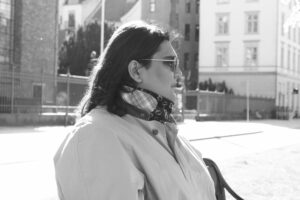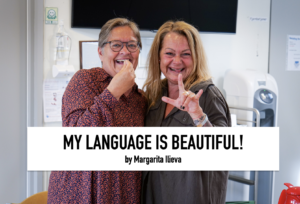Denmark is the first country in the EU to revoke residence permits of many Syrian refugees, pushing ahead to achieve the zero-asylum-seekers target despite facing domestic and international condemnation, and in spite of the success of Al-Assad in the recent elections in Syria.
By Jana Mahmoud

Syrian refugees protesting against the Danish decision in Aarhus – 19 May 2021 – Image by: Jana Mahmoud
The government of Denmark, especially its Social Democratic wing, argues that some parts of Syria are now safe for many refugees to return, and the asylum contract should eventually reach an end while many human rights supporters believe that this decision is certainly wrong.
The authorities in Copenhagen based the conclusion of Syria being safe on a Country of Origin (COI) report issued in 2019 by several researchers specialized in the Syrian case, but the researchers themselves have distanced themselves from its findings saying: “We condemn the Danish government’s decision to remove temporary protection for Syrian refugees from Damascus; as a matter of policy, no Syrian can be reasonably believed to be safe enough to remove his protected status in order to force his return to Damascus, nor to anywhere else in Syria.”
“The decision of the Danish government to revoke the asylum status of a number of Syrian refugees is based on a flawed report” says Bente Scheller, one of the experts who issued the report, and a specialized expert in Foreign and Security Policy of Syria.
Scheller believes that all over the world right-wing parties are pushing for racist, misogynist, and excluding policies, so instead of giving in by sacrificing human rights, democratic parties should not stray from their path and live up to international norms, humanitarian values and ethical standards.
The Basis of the Danish decision
Successive governments in Denmark have held strong anti-immigration campaigns, and the main goal was and still is reaching zero-asylum seekers.
In a statement sent by the Danish minister of immigration and integration, Mattias Tesfaye, he said: “The decision to reassess the residence permits was based on a conclusion on the general security situation in Damascus, from the Danish Refugee Appeals Board.”
According to the Refugee Convention, the “main principle is non-refoulement, which asserts that refugees should not be returned to a country where they face serious threats to life or freedom.”
The Press Officer of the Danish Immigration Service, Nils Bak, believes that in both the Human Rights Convention and the Refugee Convention, the conditions for returning refugees to their homeland are extremely different.
Bak refers to the Refugee Convention assuring that it implies that fundamental changes in the society, in terms of becoming more stable and secure, is what determines the fate of refugees.
However, “People fleeing because of bombings and general conditions are called war refugees who could be returned even if the conditions in their country were unstable, serious, and vulnerable, and this is what the European Court of Human Rights assessed previously relying on the Human Rights Convention,” says Bak.
If there is no complete state of war, the European Convention of Human Rights says that the group of refugees that has no conflict with clans, or regime, or any groups, could be sent, because it only fled due to general conditions.
“That’s why Denmark is not questioning those who, for example, are married to a refugee who has protection under the Refugee Convention, and in this case this person and his family would not be returned to their country because they would be in direct conflict with the regime or any political group in Syria,” believes the Press Officer.

The 1951 Refugee Convention – Source: UNHCR – https://www.unhcr.org/neu/dk/refugee-convention-2
Foreign and International Criticism
The UN Human Rights Council was one of the first critics of the Danish decision to revoke many Syrians’ residence permits. It issued a report based on 8000 witness accounts assuring that: “The Syrian government has arbitrary arrested and detained individuals, and committed war crimes and crimes against humanity in the context of detention.” (section 83)
In an interview with Anders Aalbu, the Spokesperson for UNHCR’s Nordic branch, he said that UNHCR is extremely concerned about this development as the recent improvements in the security situation in some parts of Syria, including Damascus, are not sufficiently fundamental, stable, or durable to justify ending international protection of any group of refugees.

Anders Aalbu, Spokesperson for UNHCR’s Nordic Branch. Source: UNHCR-Nordic Countries
“The Danish focus on issuing short-term temporary permits, and re-assessing protection status when they expire, leaves concerned children, women and men in constant fear of having their protection abruptly ended and at risk of being returned,” says Aalbu. “Such instability and uncertainty are detrimental to refugees’ ability to lead normal lives and integrate into Danish society.”
Criticism of this decision also came from the EU Parliament in the 39th resolution issued in March 2021. The EU reminded all Member States that Syria is not a safe country to return to and said that they must refrain from shifting national policies towards depriving certain categories of Syrians of their protected status.
According to Zaid Al Azem, an international lawyer specialized in asylum laws, the Geneva Convention provided that “refugees cannot be expelled, returned, or refouled to their countries or any other country where their lives or freedom would be threatened.”
“Denmark is basing its decisions on some conventions and laws at the expense of others to serve its policies’ interest, while it must study all Conventions related to refugees and then issue its decisions ” says Al Azem.
Domestic Criticism
The Danish Refugee Council (DRC) was one of the first organizations that advised the Danish government not to insist on its decision.
The Secretary General of the Danish Refugee Council, Charlotte Slente, believes that the logic of such a decision must be questioned saying: “we do not think that this policy represents a dignified treatment of people in general and especially those who have fled the horrors of war.”
“Under the Danish law, it is not possible for the Danish authorities to forcibly send Syrians back due to the lack of diplomatic relations between the authorities of the two countries. Instead, people in Denmark who have their residence permits revoked or their applications for asylum rejected are left in limbo at departure centres as a mean to incentivize them to go back to Syria despite the insecure conditions,” replies Slente when questioned on the fate of refugees.
Not only DRC condemns the Danish decision, but also non-governmental organizations in Denmark assure that this decision challenges Human Rights. Mellemfolkeligt Samvirke, a Danish non-governmental organization fighting for a more just and sustainable world, organized a demonstration in Aarhus on the 19th of May to tell the government that not only Syrians are against the decision, but all Human Rights’ supporters.

People demonstrating in Aarhus saying “Syria is not safe” / Photo: Jana Mahmoud 
A Syrian refugee with her flag / Photo: Jana Mahmoud 
People demonstrating in Aarhus / Photo: Jana Mahmoud
Mads Dahl, the secretary for the Aarhus-branch of this organization believes that Danish politics in recent years has shifted, and there is a lot of ignorance regarding refugees’ issues. “Racism is a big problem in Denmark, but I don’t think it is a racist country, this is what we are trying to convey in this demonstration,” said Dahl. “However, racism plays an underlying role in politics of the country.”
“Criticism is not enough,” says Anemone Samy, an activist who joined the peaceful demonstration in Aarhus and talked about a Citizen-Proposal for a more humane and solidarity-based refugee policy in Denmark.

Anemone Samy, a Danish activist participating in demonstrations to support Syrians / Photo: Jana Mahmoud
Relying on the Danish Law, Samy assures that if this proposal reaches 50.000 votes, the parliament is obliged to discuss it again. “Thus, it is not enough to only talk about the issue, but we should do our best to influence the change in the government’s decision,” asserts Samy.
Fate of Refugees
Denmark is a country that does not hold diplomatic ties with the Syrian regime, thus refugees who refuse leaving the country may not be able to be sent to their home-country, Syria. Therefore, they would be taken to deportation centers where they cannot work or participate in any educational program, and they might be separated from their families.
Rasmus Stoklund, a Social Democrat and a member in the Immigration and Integration Committee, tweeted that the Danish government has no plans to cooperate with the regime in Syria on forced deportations.
In this regard, the Council of Europe sent the Danish government a report carried out by the European Committee for the Prevention of Torture and Inhuman or Degrading Treatment or Punishment (CPT) , saying that the Danish asylum Centre, Ellebæk in North Zealand is “unacceptable for people”, it is like a “prison”.
However, Denmark recently signed a migration agreement to Rwanda intending to open an “asylum-processing facility” there.
Losing our Lives
Faeza Satouf, a Syrian nursing student in Denmark, who fled the war in Syria in 2014, had her residence permit revoked in April after receiving a message she feared most, stating: “on April 30, you will be deported from Denmark.”
Faeza believes that it’s strange that she was the only one in her family having her residence permit revoked and she believes that Syria is not safe for people to return questioning: “How do they think Syria is peaceful and safe? Al-Assad is still in power and I would definitely be arrested if I go back because my father is wanted by the Syrian regime.”

Faeza Satouf was granted asylum in Denmark in 2015. Six years later, she has been told she has to go back | Photo: AP Photo/David Keyton
Satouf didn’t lose her dream of staying in Denmark, but she continued pressuring and talking about her situation to have her case re-opened again in the Refugee board.
Her case is now being studied again in the Refugee board, and in the meantime, she can go to work and to her nurse studies.
Mohamed Alatta, a Syrian refugee in Denmark, was nine years old when he lost his father in Syria and he later fled with his mother and siblings to Denmark seeking refuge.
The future of his mother and younger siblings is uncertain because they have received a message saying that their residence permits cannot be renewed.
“My mother cannot go back to Syria. I am afraid she will be tortured or killed because she would be held responsible for deserting us from the military in Syria,” says Mohamed.

Mohamed Alatta, a Syrian refugee in Denmark / Photo: Jens Dresling / Politiken
He said that the “dictator” Al Assad made him lose his father, and he cannot afford losing his mother too; “Al-Assad won in the latest elections one more time, so there is no chance to feel safe in a country which he rules,” Alatta asserts.
“If she goes back, my mother may be also killed for talking about our story in foreign media to say that we were tortured under the Syrian regime, and we are victims of a dictatorship,” says Mohamed.
According to the Danish government, the decision to revoke residence permits of many Syrians in the country is legal and follows international conventions and laws. However, international organizations believe that it shows no mercy and violates human rights laws.





